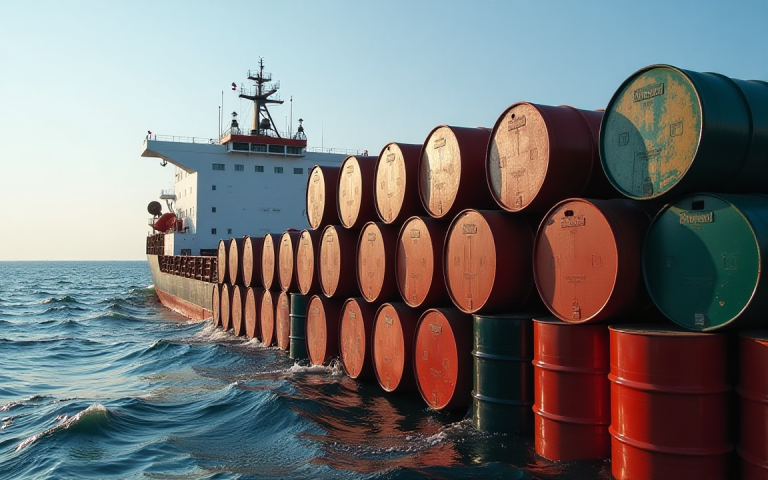Iraq is seizing the opportunity presented by reduced Russian crude exports, utilising its strong infrastructure and desirable medium-sour crude to capture a larger share of the Asian oil market.
Independent Chinese companies like Geo-Jade, United Energy Group, Zhongman, and Anton are significantly expanding their presence in Iraq’s upstream oil sector.
Their objective is to double their current output, reaching 500,000 barrels per day (bpd) by 2030, according to a Signal Group report.
These upstream endeavors are further supported by integrated investments, such as Geo-Jade’s South Basra project, which encompasses the development of a new refinery and petrochemical complex.
The Signal Group provides extensive shipping knowledge with advanced analytics.
Shifting dynamics
While Chinese refiners are securing long-term crude supplies from Iraq, Indian refiners are dealing with immediate supply chain issues.
Indian state refiners have halted spot purchases of Russian crude due to US sanctions and tariff concerns, leading them to seek crude from other sources, according to the report.
In late July 2025, the US imposed a 25% tariff on Indian exports.
This action was explicitly linked to India’s ongoing acquisition of Russian crude oil and military hardware, and was broadly perceived as part of a larger strategy to target nations maintaining significant commercial ties with Moscow.
An executive order on August 6 imposed an additional 25% tariff on Indian goods, effective in 21 days, raising India’s total tariff exposure to 50%.
Indian officials condemned this as discriminatory, citing that other major importers of Russian oil haven’t faced similar US punitive actions.
Indian Oil Corporation recently procured various crude oil substitutes: one VLCC of West Texas Intermediate (WTI) from Mercuria, three Suezmaxes of WTI from Phillips 66, Equinor, and Vitol, one VLCC of Das blend from Trafigura, and one Suezmax of WCS from Vitol.
The Signal Group said:
Despite this diversified response, Iraqi grades remain a favored long-term replacement, given their compatibility with Indian refining systems and existing logistics.
Iraq’s position in Asia
Iraq is the third-largest crude supplier in the Arabian Gulf, accounting for 19.0% of the market share, trailing only Saudi Arabia and the UAE, the Signal Group said.
Based on July 2025 tanker tracking data, China and India are the two most critical markets for Iraqi dirty crude exports. China accounts for 48% of these exports, with India following at 38.4%.
India’s demand for Iraqi crude is driven by Iraq’s reliable supply of medium sour grades, ideal for Indian refineries, and competitive pricing and quality.
Iraq could further benefit from shifts in market sentiment or stricter policies on Russian oil, the report added.
Upstream expansion
In 2025, Iraq has escalated its upstream development efforts, aiming for a medium-term production capacity of 6 million barrels per day by 2028-2029.
Accelerated well activity and field modernisation, combined with new licensing agreements involving both international and Chinese partners, are driving this initiative, according to the Signal Group.
The Iraqi Drilling Company officially reported the completion of 113 oil wells in the first half of 2025. This total comprises 27 newly drilled wells and 86 rehabilitated wells, distributed across Iraq’s southern and northern regions.
Iraq’s southern supergiant assets, including West Qurna 1, Zubair, Rumaila, Majnoon, Faihaa, and Ratawi, are undergoing significant field-level development.
PetroChina’s West Qurna 1 targets 750,000 bpd by year-end 2025, while Halliburton redevelops Nahr Bin Omar to reach 300,000 bpd from 50,000 bpd.
Additionally, Iraq and BP have finalised a redevelopment plan for the Kirkuk oil cluster to restore northern field capacity.
While these initiatives aim to boost long-term production, actual output increases depend on factors like project execution, infrastructure constraints, and the ability to capture associated gas and inject water.
Volumes constrained
Signal Group said:
In the short term, however, Iraq’s crude export volumes are constrained by OPEC Plus quota discipline.
In May and June 2025, Iraq’s exports averaged around 3.2 million barrels per day, a decrease from the previous 3.4 million barrels per day, despite the country’s enhanced technical capacity.
The Organization of the Petroleum Exporting Countries and allies announced in July that voluntary oil production cuts, including Iraq’s portion, will be gradually phased out beginning in October 2025.
Iraq aims to gradually increase its official production target in the fourth quarter of 2025. This will allow for slight increases in exports, provided that project expansions remain on schedule.
The government remains committed to preventing quota breaches while simultaneously managing capacity expansion and market equilibrium.
July data shows rebound
Iraq’s crude oil exports from the Arabian Gulf have shown a fluctuating trend over the past year, according to the report.
After a strong start, volumes dipped in March and April, sharply declining in May and hitting a low in June.
July saw a rebound, potentially due to increased demand from Asian buyers, especially as Chinese and Indian refineries ramp up crude intake in the third quarter for seasonal restarts and pre-winter stockpiling.
Iran decreased the official selling prices (OSPs) for its primary crude grades offered to Asian refiners in July 2025, a change from the previous month’s pricing.
“These month-on-month adjustments in July reflect a relative softening in Iranian pricing across all grades,” the Signal Group said.
While the direct impact on market share is not publicly documented, such pricing behavior may reinforce Iran’s competitiveness among price-sensitive Asian refiners, especially at a time of heightened geopolitical uncertainty in neighboring crude-producing regions.
The post US tariffs push India away from Russian oil, bolstering Iraq’s position in Asia appeared first on Invezz

